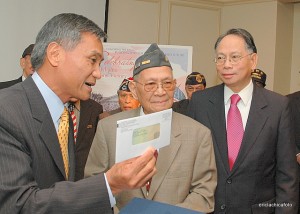
Former U.S. Army Maj. Gen. Antonio Taguba, representing the VA Secretary, presents the $15,000 “Equity Compensation” check to Alberto Bacani, a 98-year-old Filipino American veteran from Alexandria VA, as Philippine Ambassador Willy Gaa looks on, in the Bataan Day of Valor reception at the Philippine Embassy in Washington.
But this is where we must go amok.
But the lump sum money, without interest, is part of a compromise that doesn’t quite make vets like Bacani whole.
Just wait two years to see if anyone is smiling.
On the whole, one must be happy for the Filipino Veterans of WWII who have been finally remembered in that new $787 billion federal stimulus bill passed by Congress.
But being remembered is one thing. Being shortchanged is another.
Nearly 500,000 Filipino nationals who fought under the U.S. flag during World War II were promised full rights and benefits by Roosevelt in 1941. But they were denied by President Truman in 1946 when with a stroke of the pen any and all promises made to the fighting Filipinos were rescinded.
The vets have had their advocates throughout the years, but community politics was all about the Marcos dictatorship until the early ’80s. After that, however, the aging veterans were the rallying cry of the community. And the fight was for “equity”-not compromise.
Every Congress, the battle would be waged. Every year the vets would be a few votes closer. But every year more vets would die. The stall/attrition tactic finds the number of eligible Filipinos down to about 15,000. Lobbying Congress has been its own death march.
To be included in the stimulus is a real breakthrough of sorts. The vets get something: A lump sum of $15,000 for those who are U.S. citizens; $9000 for non-citizens who are in the Philippines.
It’s just not like the $900 a month pension a normal low-income vet would get until the day he dies.
This lump sum comes with a catch.
If a vet lives longer than 2 more years, then what? More money would be helpful. But there is no more money. But in the end, it all turned into an actuarial game. As the vets died off, the numbers declined. It finally reached a point where the U.S. could afford to give the vets next to nothing. After inflation and the devaluation of money, the U.S. gets off cheap.
The money becomes nothing but a symbol. Will it pay their bills? Help them to live out their lives in dignity? This is a ticket to penury.
But what a ceremony it makes. Give a check to a dying vet. Better than ignoring them all for the last 50 years or so, I suppose.
In all my discussions with people on the inside of the negotiations, it was said that this was the best outcome for now in what had become the death march of politics.
So why doesn’t it all feel better than it does?

why not send the checks to all veterans right now before they die??
why not send the checks to all the qualified fil vet before they become ill? They will no longer enjoy the benefit?